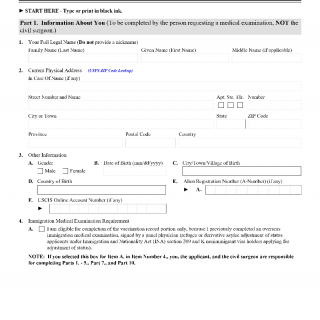Form I-693. Report of Immigration Medical Examination and Vaccination Record
The I-693, Report of Immigration Medical Examination and Vaccination Record is a form that is required by the United States Citizenship and Immigration Services (USCIS) for applicants seeking adjustment of status to permanent residence. The purpose of the form is to document the results of a medical examination that is required to ensure that the applicant is not inadmissible to the United States on public health grounds.
The form consists of several parts, including the applicant information, the medical examination results, and the vaccination record. The important fields in the form include the applicant's personal information, such as their name, date of birth, and address, as well as the results of the medical examination, which includes a physical examination, a tuberculosis test, and a list of required vaccinations.
The parties involved in completing the form include the applicant, the designated civil surgeon who performs the medical examination, and the USCIS. It is important to consider the specific guidelines and requirements when completing the form, as any errors or omissions can result in delays or denials of the application.
Data that will be required when filling out the form includes the applicant's personal information, immigration status, and previous medical history. In addition, the applicant will need to provide proof of vaccination for certain diseases, such as measles, mumps, and rubella.
Documents that must be attached to the form include the results of the medical examination, proof of vaccination, and any other relevant medical records. Practice and use cases of the I-693 form include individuals applying for adjustment of status to permanent residence, as well as those seeking certain types of visas, such as the K-1 fiancé visa.
Strengths of the form include its ability to ensure that applicants are not inadmissible to the United States on public health grounds, while weaknesses include the potential for delays or denials if the form is not completed correctly. Alternative forms and analogues include the DS-2053, Medical Examination for Immigrant or Refugee Applicant, which is used by the Department of State for overseas medical examinations.
To fill out the form, the applicant must first schedule a medical examination with a designated civil surgeon. The surgeon will then complete the examination and fill out the necessary portions of the form. Once completed, the form should be submitted to the USCIS along with the application for adjustment of status or visa application.
The completed form is typically stored by the USCIS and used to determine the admissibility of the applicant to the United States on public health grounds.

